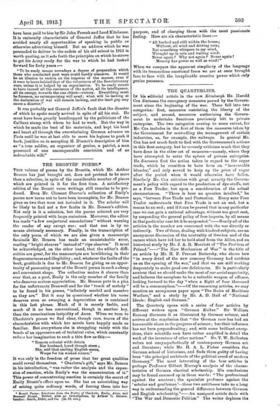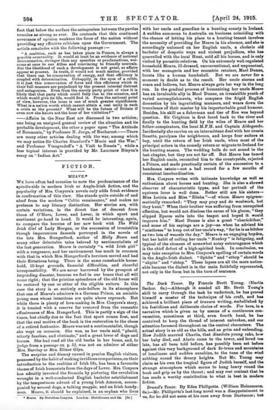THE QUARTERLIES.
IN his editorial article in the new Edinburgh Mr. Harold Cox discusses the emergency measures passed by the Govern-
ment since the beginning of the war. These fall into two categories: first, measures restricting tho liberty of the subject, and second, measures authorizing the Govern-
ment to undertake functions previously left to private
enterprise. The two categories overlap to some extent, for Mr. Cox includes in the first of them the measures taken by the Government for controlling the management of certain industries, as, for example, the railways. In general Mr. Cox bee not much fault to find with the Government's actions in this first category, but he severely criticizes much that they have done in the other set of measures—namely, where they have attempted to enter the sphere of private enterprise. He discusses that the action taken in regard to the sugar trade, which he considers to have been an " inexcusable blunder," and only served to keep up the price of sugar after the period when it would otherwise have fallen. Similarly Mr. Cox criticizes with great severity the Govern- manes policy with regard to the production of dye-stuffs, not as a Free Trader, but upon a consideration of the actual circumstances. " There is here no question involved," he says, "between Free Trade and Protection. Every sane Free Trader understands that Free Trade is not an end, but a means to an end ; and if it can be proved that in any particular case we can gain a national advantage, without too great cost, by suspending the general policy of free imports, by all means in thatparticular case let it be suspended."—Nearly all of the articles in the number are concerned with the war directly or indirectly. Two of these, dealing with kindred subjects, are an anonymous discussion of the neutrality of Sweden and of the causes which have led her to hold aloof from the Allies, and an historical study by Mr. J. A. R. Marriott of " The Problem of Poland."—" The New Mechanism of War" is the title of an article by Mr. H. F. Prevost Battersby, who shows how "in every detail of the new armoury Germany had outdone us on the opening of the war," and that we are still working desperately to make good our deficiencies. Ho is particularly anxious that we should make the most of our aerial superiority, and believes the aeroplane to be a valuable weapon of offence, looking forward to the day "when a flight of four thousand will be a commonplace."—Of the remaining articles, we may mention an anonymous paper upon" The Rules of Maritime Warfare," and a study by Mr. A. D. Hall of "National Ideals : English and German."
The Quarterly opens with a series of four articles by different writers upon "Gorman %altar." Sir William Ramsay discusses it as illustrated by German science, and arrives at the conclusion that " the German race has had an honourable share in the progress of science ; but their influence has not been preponderating ; and, with some brilliant creep- tione, their scientific men 'have rather amplified in detail the work of the inventors of other nations." hlr.T. W. Rolleston writes not unsympathetically of contemporary German art and literature; while Mr. H. A. L. Fisher considera the German school of historians, and finds them guilty of having been " the principal architects of the political creed of modern Germany." The most interesting of the four articles is perhaps Professor Gilbert Murray's analysis of the charac- teristics of German classical scholarship. His conclusions may be found summed up in these words: "The professional against the amateur; the specialist professor against the 'scholar and gentleman'—these two antitheses take us a long way in understanding the general difference between German and English scholarship."—An unsigned article deals with "The War and Domestic Politics." The writer deplores the
fact that below the surface the antagonism between the parties remains as strong as ever. He contends that this continued severance of opinion weakens the force of the nation without providing any effective criticism upon the Government. The article concludes with the following passage :—
" A coalition, such as has taken place in France, is always a possible event arlity. It would at least be an evidence of national determination, stronger than any speeches or proclamations, wel- come at once to our Allies and convincing to friendly neutrals. But the likelihood of such a development is not great, as affairs appear at present. In truth, it would not much matter, provided that there can be conservation of energy, and that efficiency is coupled with determination. Unhappily, in the eyes of a critic, it is just this conservation of force and this efficiency which in their full measure are prejudiced by the present internal distrust and antagonism. Even from the merely party point of view it is likely that that party which could fully rise to the occasion, and which would give its life, would find it. From the national point of view, however, the issue is one of much greater aignificance. What is a nation worth which cannot attain a real unity in such a crisis as the present? What will be the future of Britain if even now she knows not the hour of her visitation?"
—Affairs in the Near East are discussed in two articles; one being an unsigned general review of the situation and its probable development, the other a paper upon "The Attitude of Roumania," by Professor N. Jorga, of Bucharest.—There are many other articles dealing with the war, among which we may notice Sir Charles Stanford's "Music and the War," and Professor Vinogradoff's "A Visit to Russia"; while a lees topical interest is provided by Mr. Laurence Binyon'a essay on "Indian Art."















































 Previous page
Previous page